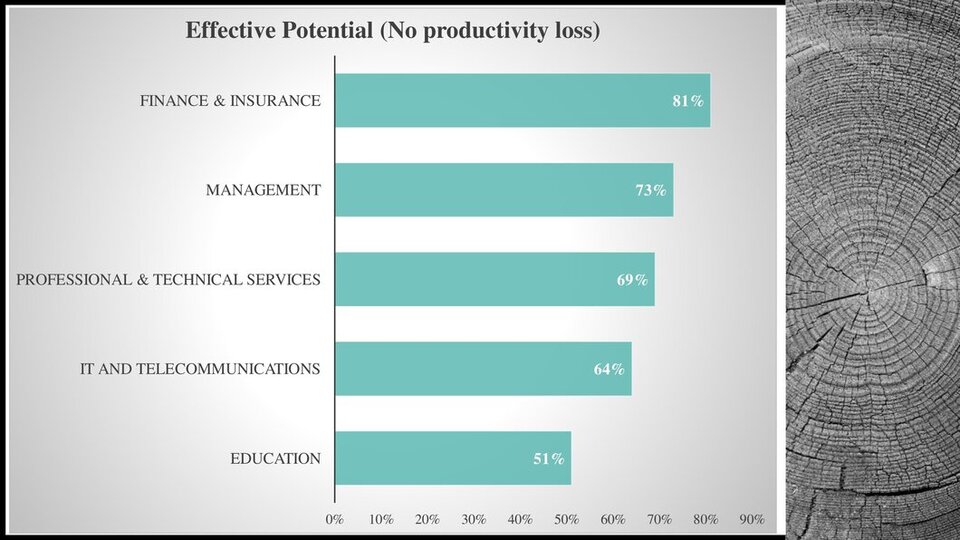
Having the freedom to work remotely on your own schedule can seem like a dream come true, but remote work success requires more than just the ability to work from home or at an internet café. It takes strong leadership skills, meticulous attention to detail, and an ability to communicate clearly with colleagues who may be in different time zones and have different cultural backgrounds. Before we look into the details of skills to pursue a career in remote work, let’s first look at some other critical aspects of remote work.
Tasks and activities, not occupations, determine remote work possibilities
To properly assess the future sustainability of remote work, we’d like to identify the tasks and professions that can be done from home, as well as expand our framework to include more information about where the job is done. According to a research, remote work is only available to highly skilled, highly educated people in a few businesses, occupations, and areas.
Employees and companies face a wide range of concerns and obstacles as a result of remote employment. Employees are attempting to strike the optimum work-life balance while also preparing for remote working and collaboration. Companies are debating the best ways to give training virtually and how to set up workspaces to improve employee safety.
Remote work Feasibility: McKinsey Study
A study done by McKinsey looked at work that doesn’t necessitate interaction or physical presence. They analyzed over 2000 activities in over 800 occupations using a workforce model based on the Occupational Information Network (O*NET) to determine which activities and occupations offer the most potential for remote employment. The ability to work from home is determined by the variety of actions undertaken in each occupation, as well as the physical, geographical, and interpersonal setting.

McKinsey began by determining the conceptual degree to which an activity may be performed remotely. Depending on whether the worker is required to physically perform a task, interact with others, or use specific equipment or machinery on site, this can differ. There were also other activities, including coaching, counselling, client relationship building, onboarding, and negotiating, that could only be done efficiently in person.
Updating knowledge and interacting with technology via computers are two of the most remote work-friendly tasks. To analyze the total scope for remote work, McKinsey looked at the hours required for various tasks within occupations and noticed that successful remote work is strongly skewed towards a few sectors.
It’s true that India is internationally known for its high-tech and financial industries, but most of its workforce are employed in occupations such as retail services and agriculture that cannot be conducted remotely.
Explain why you’re doing what you’re doing
Make a strong case for why remote employment is beneficial to your company. More than just a cost-cutting strategy, the justification must be based on the company’s goals and culture, as well as lessons learned from the pandemic.
Work-from-home proposals don’t have to be long and elaborate, but you should have an official document showing that you have put significant thought into this request. Include the following items in your proposal:
- What level of flexibility do you require – 100% remote work, a few days each week working from home, etc.
- The basis for your proposition from a business standpoint. Prepare data and be able to articulate your objectives and how working remotely will help you achieve them.
- An example of a schedule with expected working hours
- Details on how you’ll continue to do your job from home even if others are at work—for example, a weekly meeting with coworkers.
- The impact on clients, employees, and bosses, as well as how you’ll handle it
- Communication strategies, including when and how you will be available, and how you will stay in touch with the onsite employees
One size will not fit all
Workforce assessment needs to focus on why remote working might be beneficial, how it might affect individuals and their roles, and the connections between them. There are a variety of employment arrangements available in the future: totally remote, fully on-site, or a hybrid. Many companies such as Shopify, Quora, Dropbox now allow their employees to work from home as a permanent solution.
Skills for a Successful Remote Work Career
Following the epidemic, more than 74 percent of businesses plan to transfer at least portion of their staff to remote work permanently. As a result, firms are most likely to hire people who not only possess the required skills for the open post, but also possess the core competences required to succeed in a remote position.
Communication

Just because you work remotely doesn’t mean you don’t need to communicate. It just means you can avoid awkward sit-down meetings. Make communication a core component of your remote work strategy with tools like Slack and Skype (even if it means using them in addition to scheduled office hours).
And, importantly, make sure everyone on your team knows how to use them! A hybrid approach will help keep employees engaged while allowing businesses to save money by cutting down on unnecessary travel expenses. Businesses looking to create or improve their remote work policies should look at some key sectors that are embracing hybrid work cultures today: telecommuting in real estate; virtual call centers; freelance designers working from home; and consulting firms utilizing consultants who are spread across multiple locations. If they can do it, so can you!
Time Management

A hybrid work culture enables us to be productive and still have time to enjoy our personal lives. Whether you are self-employed or working on contract, your time management skills will be key. To successfully manage your time, try these tips: create a schedule that you can stick to; be proactive when it comes to sending out job applications, as opposed to reactive; make use of technology; and know that every project is different – if your last project went longer than anticipated, don’t assume that future projects will also go over their deadline.
And remember: more vacation days does not equal more productivity! Work/Life Balance: In a remote work environment, it’s important to maintain a healthy balance between your professional life and personal life. If you find yourself stuck in front of your computer all day long without any real break from work responsibilities, then perhaps remote work isn’t right for you. But if you have good time management skills (see above), then finding balance should be relatively easy.
There are plenty of resources available online that can help with making sure there is no overlap between your professional and personal life (e.g., scheduling meetings outside normal business hours). For example, check out Slack’s Do Not Disturb feature, which allows users to temporarily shut off incoming messages while they focus on other tasks.
Collaboration

Working with teams is an increasingly important part of work, and it’s also where remote work shines. Many companies are experimenting with hybrid work cultures in which team members collaborate on projects even if they aren’t located in the same physical space. This practice creates opportunities to build connections, foster community, and take advantage of all talent available in your organization. The possibilities are endless—so get ready to flex your collaborative muscles!
If you want to be successful at working remotely, you need to be good at collaborating. Collaboration doesn’t just mean you can share ideas and information effectively; it means that you can integrate multiple perspectives into one cohesive unit that works toward a common goal. Here are five skills you need to make sure collaboration happens smoothly.
Interpersonal Relationship

Working remotely is hard. Even though you won’t be in a physical office, you will still be dealing with human beings every day. Often your boss and/or coworkers may live across an ocean or time zone, but that doesn’t mean your work communication has to suffer. Communication needs to remain at peak performance even though you are not face-to-face.
Establish open lines of communication to make sure everyone stays on track. This means weekly check-ins and instant messaging (IM) throughout the week. Make sure you have all of your IM contact information listed on your resumé so potential employers can easily get in touch with you when they need to. If possible, consider having video chat meetings once a week or once a month so people can see each other’s faces. This helps build rapport and makes it easier to communicate about sensitive topics such as compensation.
Client Relationship

As with any job, building a good rapport with your client is important. After all, you’re not just working for them; they’re paying you to provide them with what they need from you and there’s an emotional level that comes into play. Take time to do research on clients before you begin your remote work project so that you can have at least a preliminary idea of who they are and how best to approach them when questions or problems arise.
The better your communication, understanding, and ability to make suggestions about their project, the more likely it is that they will be pleased with your work. Good client relationships mean repeat business which means (you guessed it) increased income! And even if you aren’t being paid by them, but instead being paid by someone else to do work for another company through Fiverr, having good client relationships will ensure that you don’t get a bad review which could hurt your chances of getting hired in future. In short: put in some effort early on and reap the rewards later!
How many projects should I take? This question can only be answered based on personal preference because everyone has different goals and expectations when starting out. Many people find success in taking one or two projects at first until they gain experience, while others like to jump right in and try multiple jobs simultaneously as soon as possible.
Leading the way to remote work schedule
Working from home has fast become a legitimate long-term alternative for companies and people due to good results such as agile teams, adoption of technology-based solutions, and collaboration platforms. Both Twitter and Facebook are shifting some workers to remote work.
Companies are attempting to capitalize on the advantages of the work-from-home experience, which include speed, innovation, and employee satisfaction. A company’s ability to hire talent, retain employees, and engage employees could also benefit from a permanent remote work option.
Leaders should carefully assess all of their options before committing to a new way of working and keep three points in mind when thinking about the future of remote work.
Conclusion
Is working from home beneficial to productivity? Given the extended period of declining worker productivity that preceding the epidemic, the response may ultimately determine its popularity.
After experiencing working remotely during the pandemic, employees have grown more confident in their productivity, with more people saying they were more productive during that time. Connectivity could be a bottleneck to productivity. Significant public and private investment will be required to build digital infrastructure. Home office equipment, digital tools, and better connectivity devices have all seen a surge in sales. Many policies and processes for companies will need to be reinvented as a result of employees working outside the office.
A remote or hybrid remote work environment is generally well-suited to digital marketing, business analysis, or HR specialist roles. If you’re having trouble finding work near to home, try a remote employment to broaden your search. Our career section has employment openings. Take a look around and see how GeopFX can help you achieve your career goals.


